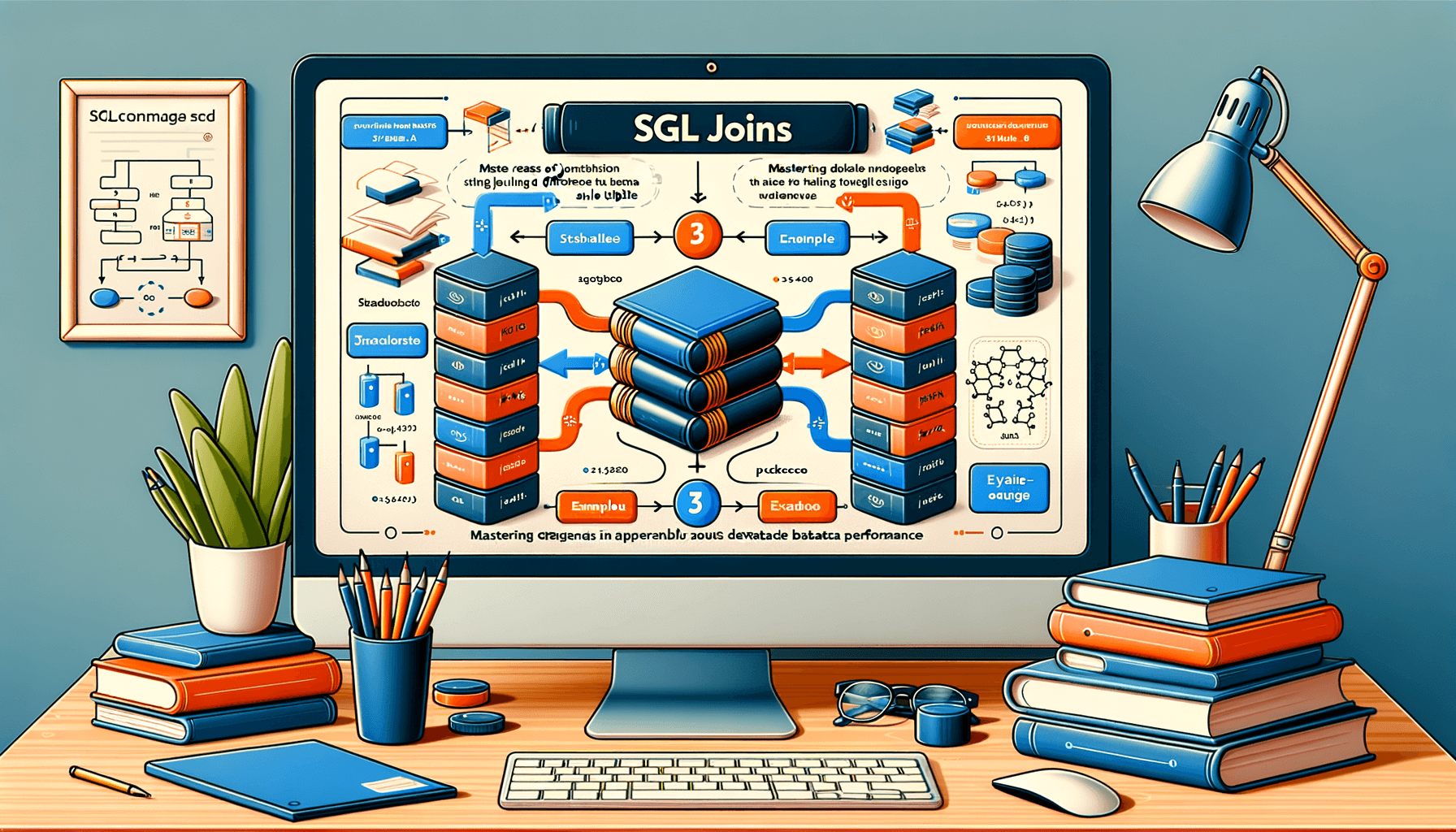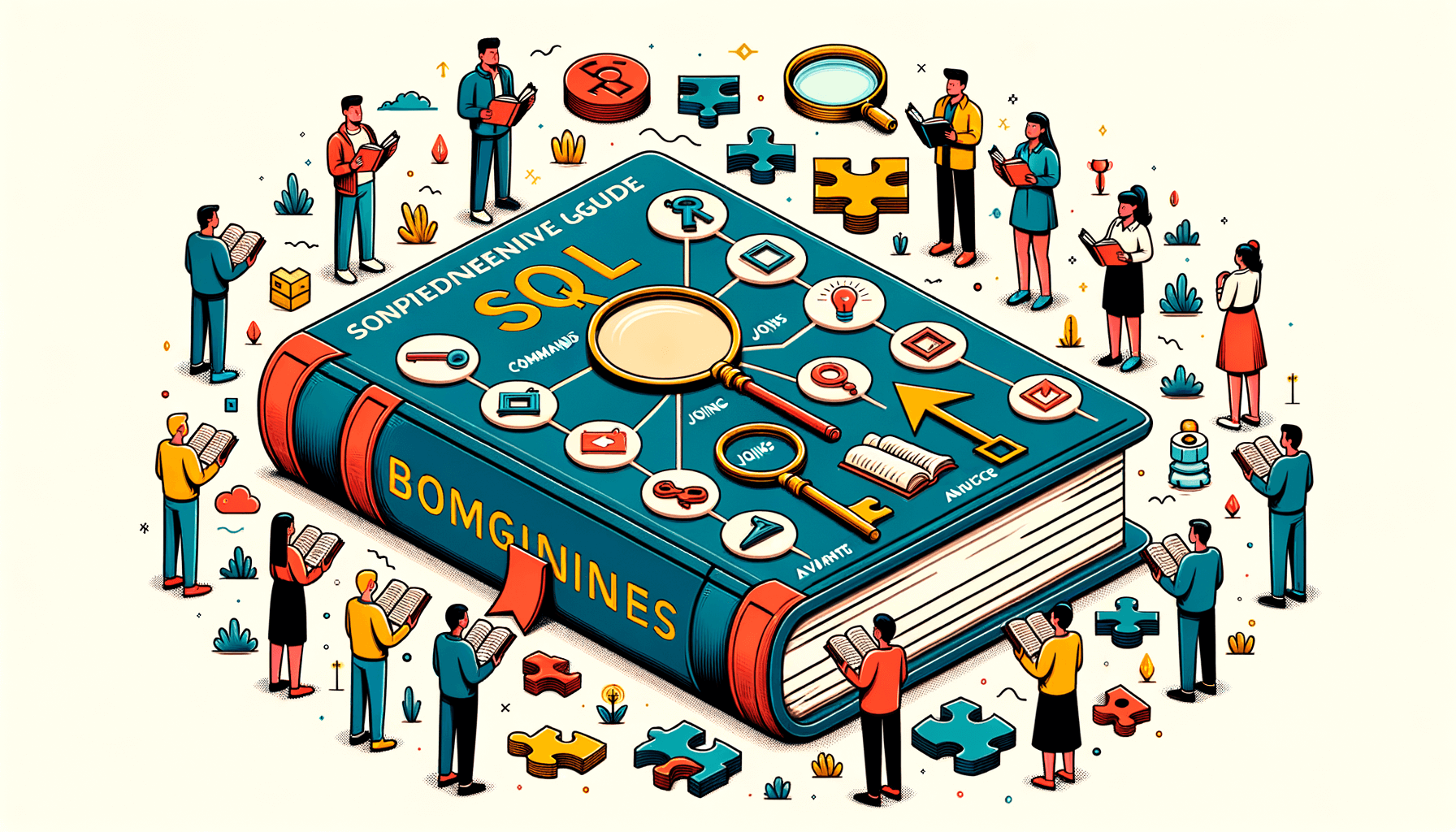A big variety of articles and resources

Top SQL Courses to Boost Your Database Skills
 Sia Author and Instructor
Learn SQL
Sia Author and Instructor
Learn SQL
12 minute read
The Complete SQL Bootcamp: Go from Zero to Hero
Offered by: Jose Portilla
Price: $85 (unlimited access)
Rating: 4.7/5
The Complete SQL Bootcamp is arguably the best SQL course on Udemy. It’s highly relevant for a beginner and covers the basics of SQL syntax in PostgreSQL (a popular SQL dialect). This includes the GROUP BY clause, joining tables, and other SQL constructs.
Key Information
- Prerequisites: None
- Instructor: LearnSQL.com
- Level: Beginner
- Free or Paid: Paid
- Certificate: Yes
- Duration: 84 hours (text content and assignments)
Pros
- Write actual SQL queries, tackle exercises, and get immediate feedback.
- Simple, engaging way to get comfortable with SQL fast.
- Actively apply what you learn as you go.
Cons
- Fully automated self-paced tasks without live communication.
A top attraction for this SQL course is its accessibility, which students rave about!
Why We Chose This Course
Not only is this possibly the best SQL course on Udemy, but it’s one of the best SQL training courses to learn SQL and PostgreSQL skills, like making queries and performing data analysis. You’ll also learn to read and write complex database queries. A top attraction for this SQL course is its accessibility, which students rave about!
SQL for Data Science (UC Davis)
Overview
The University of California, Davis offers this comprehensive course aimed at aspiring data scientists. Led by Sadie St. Lawrence, who has trained over 70,000 people in data science, this course is part of the Learn SQL Basics for Data Science Specialization. You'll receive a certificate of completion after finishing the course.
Skills You'll Gain
- SQL Basics
- Data Analysis
- Data Science
- SQLite
- Data Management
- Data Model
- Databases
Course Details
- Rating: 4.6/5 (based on 17K reviews)
- Duration: 1 - 4 Weeks
- Price: $39 USD per month
Additional Information
This course is perfect for beginners and covers essential topics such as databases, SQL, data management, and data analysis. It also delves into more advanced subjects like big data, data architecture, and cloud platforms.
Learn SQL
Learning SQL is less straightforward than languages like Python simply because of the setup required to run SQL queries. For example, unless you're fortunate enough to have access to a fully set up database already, you first need to install and run a Postgres server, initialize some tables, and insert data to start learning how to query a Postgres instance. Therefore, beginning with the right course is pivotal to having a smooth SQL learning experience.
What is the Best Way to Learn SQL?
To accelerate SQL learning with free effective strategies, it's essential to understand the basics, key concepts, and benefits. Choose quality resources for career opportunities.
What Skills or Experience Do I Need Before Learning SQL?
While no prior experience is strictly necessary, having a basic understanding of databases and some programming knowledge can be beneficial. This foundational knowledge will help you grasp SQL concepts more quickly.
What Jobs Use SQL?
SQL is a versatile skill used in various job roles, including data analysis, software development, and database administration. Mastering SQL can open doors to numerous career opportunities.
Starting with the right course can make all the difference in your SQL learning journey.
SQL & Database Design A-Z: Learn MS SQL Server + PostgreSQL
Overview
This course is perfect for those who want to gain a deeper understanding of SQL and database design. It covers almost all the topics an application developer should know about SQL. You'll learn to handle SQL statements and various joins, including cross, outer, inner, self, left, and right joins.
Key Topics Covered
- Creating basic SQL queries
- Different types of joins: right, left, inner, outer, cross, self
- Advanced SQL queries
- Creating tables and using indexes
- Database design concepts, including normalization (1NF, 2NF, 3NF, BCNF)
Real-World Applications
The course focuses on enhancing your data analytics skills with real-world data science exercises. You'll explore database design concepts and learn to write SQL queries with multiple tables, joining them together to produce meaningful reports.
Course Structure
- Database Design and Basic SQL in PostgreSQL
- Overall intro to Databases, SQL, and Postgres
- Modeling data
- Creating, inserting, querying tables
- Table relationships, such as one-to-many and many-to-many
- Intermediate PostgreSQL
- More useful SQL syntax
- Aggregations
- Working with text
- Regular expressions
- JSON and Natural Language Processing in PostgreSQL
If you are interested in Data Science and want to become a data scientist, then a good knowledge of SQL will go a long way, and this course is a great place to start.
Here is the link to join this course — SQL & Database Design A-Z™: Learn MS SQL Server + PostgreSQL
SQL Fundamentals
The SQL Fundamentals course by Dataquest is designed for absolute beginners. It teaches SQL through SQLite, a file-based RDBMS, making it accessible and easy to understand. This course is ideal for those who prefer text-based, interactive learning and are interested in data science.
Course Overview
- RDBMS: SQLite + PostgreSQL
- Rating: 4.8
- Price: Free to $33/month
- Level: Beginner
Best For
- Complete beginners
- Those enrolled in a video-based course but looking for more projects to complete
Transition to Advanced Tracks
After completing the SQL Fundamentals course, Dataquest's platform allows you to seamlessly transition to more advanced tracks, such as Data Engineering. Here, you'll learn PostgreSQL and more advanced SQL concepts, as well as other data skills.
This course is highly recommended for SQL beginners who want to build their skills with interactive courses, tracks, and projects curated by real-world experts.
Introduction to SQL
Structured Query Language or SQL is a programming language that is used to manage database management systems. In today’s world, there is an increasing amount of data being generated. Management of this data is crucial because data in its raw form is not comprehensible. Data must be organized and made sense of to be made useful. SQL involves the management, organization, retrieval, manipulation, and storage of data.
What is SQL?
SQL stands for Structured Query Language. It is used for managing and manipulating relational databases. SQL is essential for anyone working with databases as it allows for efficient querying and data management.
Applications of SQL
SQL is used in various applications, including:
- Data Analysis
- Database Management
- Web Development
- Business Intelligence
Top Free Courses to Learn SQL for Beginners
Explore practical SQL skills with courses from IBM, DataCamp, and Udacity. Gain hands-on experience in querying databases and data analysis techniques.
Conclusion
Learning SQL is a fundamental skill for anyone interested in data management and analysis. It provides a strong foundation for working with databases and is widely used across different industries.
SQL for Data Analysis
Overview
SQL for Data Analysis is designed to help you harness the power of SQL to analyze and interpret complex data sets. This course is ideal for those looking to enhance their data analytics skills and make data-driven decisions.
Key Skills
- Data Manipulation
- Data Modeling
- Exploratory Data Analysis
- Statistical Analysis
Course Structure
The course is divided into several modules, each focusing on different aspects of SQL and data analysis:
- Introduction to SQL
- Data Manipulation Techniques
- Advanced Querying
- Data Visualization
- Case Studies and Projects
Career Opportunities
SQL skills are directly relevant in roles such as database administrators, data analysts, and software engineers. Additionally, professionals in fields like business intelligence, marketing, finance, and healthcare management also benefit greatly from SQL skills.
Mastering SQL for Data Analysis can significantly boost your career prospects in various data-centric roles.
FAQs
What are the best free SQL courses?
There are several free SQL courses available online that can help you get started with SQL for Data Analysis. Some popular platforms include Coursera, edX, and Khan Academy.
What types of jobs use SQL?
Jobs that frequently use SQL include data analysts, database administrators, software engineers, and business intelligence professionals. These roles often require data querying and reporting to make informed decisions.
Advanced SQL for Data Scientists
The "Advanced SQL for Data Scientists" course is a comprehensive guide to mastering SQL for analysts, covering advanced topics, optimization, big data techniques, integration with other tools, and resources for continuing education. This course is designed to elevate your SQL skills to the next level, making you proficient in handling complex queries and large datasets.
Course Overview
This section provides an in-depth look at what the course covers, including advanced SQL functions, performance tuning, and real-world applications.
Key Topics
- Advanced SQL Functions
- Performance Tuning
- Big Data Techniques
- Integration with Other Tools
- Continuing Education Resources
Learning Outcomes
By the end of this course, you will be able to:
- Write and optimize complex SQL queries.
- Utilize big data techniques for efficient data handling.
- Integrate SQL with other data analysis tools.
- Access resources for ongoing learning and skill enhancement.
This course is ideal for data scientists looking to deepen their SQL knowledge and apply it to real-world scenarios.
SQL for Developers
For developers, SQL is just as essential. It allows them to build and maintain the database structures that power websites, applications, and software systems. By using SQL, developers can ensure that the data their applications use is accurate, secure, and efficiently retrievable – crucial for delivering a seamless user experience.
Key Benefits
- Accurate Data Management: Ensures data integrity and reliability.
- Efficient Data Retrieval: Optimizes performance for faster access.
- Enhanced Security: Protects sensitive information from unauthorized access.
Practical Applications
Developers use SQL to:
- Design and implement database schemas.
- Write queries to interact with databases.
- Optimize database performance.
- Ensure data security and compliance.
Mastering SQL can accelerate your journey from novice data analyst to SQL expert, enabling you to tackle real-world problems and make data-driven decisions.
SQL Performance Tuning
SQL Performance Tuning is essential for those who want to optimize their database queries and improve overall system performance. This course is best suited for intermediate-level learners who have a basic understanding of SQL and wish to delve deeper into performance and optimization techniques. The course covers a wide range of topics, including table design, query, and index optimization, which are crucial for handling larger, more complex databases.
Course Overview
In this course, students will learn to write queries that are both efficient and easy to read and understand. The syllabus includes:
- Joins Best Practices
- Subqueries and SemiJoins
- Derived Tables and CTE
- Recursive queries
- JSON processing
- Window Functions
- Explain, Analyze, and Demystifying Execution Plans
- PIVOT, UPSERT, MERGE
- Pagination Best Practices
Key Topics
The course also dives into how SQL executes queries, Postgres tools for tuning, and various types of indexes like B-Tree, Bitmap, and Hash indexes. Additionally, it covers Nested loop, Hash, and Merge Joins, Partitioning, Materialized views, and other optimization techniques.
Navigating SQL can be challenging, but mastering performance tuning can significantly enhance your database management skills.
and more
Unlocking the Power of SQL: Essential Functions and Techniques
This course dives deep into the essentials of SQL, covering everything from basic queries to advanced analytical skills. It's perfect for those looking to enhance their SQL query crafting and database management abilities.
SQL for Data Engineers
Designed specifically for data engineers, this course focuses on data manipulation tools and query optimization techniques. It's a must for anyone aiming to improve their data integrity and overall database performance.
Practical SQL: Mastering SQL for Beginners
A hands-on approach to learning SQL, this course is ideal for beginners. It covers the basics and gradually moves to more complex topics, ensuring a solid foundation in SQL.
SQL in Practice: Real-World Applications
This course emphasizes real-world applications of SQL, making it highly relevant for those looking to apply their skills in practical scenarios. It covers a range of topics from data manipulation to query optimization.
Unlocking the power of SQL can significantly boost your career advancement opportunities, making you a valuable asset in any data-driven organization.
Discover a world of opportunities and more with our comprehensive courses designed to enhance your technical skills and career prospects. Whether you're looking to master SQL or explore other advanced technologies, our expert-led modules and AI-assisted learning will guide you every step of the way. Don't wait any longer to achieve your goals. Visit our website today and take the first step towards a brighter future!
Conclusion
Building your SQL skills is essential for anyone looking to excel in data management and analysis. With a plethora of courses available, from introductory to advanced levels, you can find the perfect fit for your learning needs. Whether you are a beginner or an experienced programmer, the courses highlighted in this article offer comprehensive knowledge and practical experience. By enrolling in these top-rated SQL courses, you can master the fundamentals, tackle advanced topics, and apply your skills in real-world scenarios. Start your journey today and unlock new opportunities in the world of data.
Frequently Asked Questions
What is SQL?
SQL, or Structured Query Language, is a standard programming language specifically designed for managing and manipulating relational databases. It is widely used for querying, updating, and managing data.
Who should learn SQL?
SQL is beneficial for anyone involved in data management, analysis, or development. This includes database administrators, data analysts, data scientists, software developers, and business analysts.
What are the prerequisites for learning SQL?
There are no strict prerequisites for learning SQL, but having a basic understanding of computer science concepts and familiarity with other programming languages can be helpful.
How long does it take to learn SQL?
The time it takes to learn SQL can vary based on the individual and the depth of knowledge required. For basic SQL, it may take a few weeks, while mastering advanced topics could take several months.
What are some of the best online platforms to learn SQL?
Some of the best online platforms to learn SQL include Udemy, Coursera, Codecademy, Pluralsight, and edX. These platforms offer a variety of courses ranging from beginner to advanced levels.
Can I get a job after learning SQL?
Yes, learning SQL can open up various job opportunities in fields such as data analysis, database administration, and software development. Many roles in tech and business require SQL skills as a fundamental part of the job.
Related Articles

Mastering SQL: How to Join 3 Tables in a Single Query
10 minute read

Mastering SQL Learning: A Comprehensive Guide for Beginners
10 minute read













